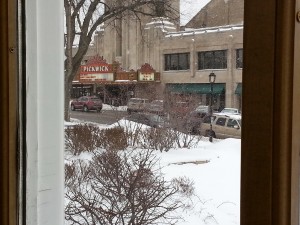
Today is Saturday, which means that I had to write like nobody’s business. I’m finding that Saturday is the key day – I don’t really have time during the work week to write. Fortunately, my dad was available to watch the girls while Bromleigh and I ventured off to the library. We found a quiet table, and I checked out Self-Editing for Fiction Writers. I received the recommendation from the talented Kate St. Vincent Vogle, and it was just the book I needed to get going on my critical paper. I had thoughts on the critical paper right after residency, and I had jotted down some notes; today was the right day to get it written and out of my life. It can only be 2-4 pages long, which is challenging. My paper was about Rainbow Rowell’s use of the third person point of view with two narrators in her book Eleanor & Park, and how she strikes a balance between intimacy with the characters, and the employment of objective plot devices that the characters are not privy to. Again, the page limit made this challenging, but I did manage to get it down to four pages. I needed to get it done. Two of my cohort members (that I know of) had already finished their critical papers, and it was the last major project that I needed to finish before I could go back to my manuscript (I already have more than enough manuscript pages, but the MS is fun, and I keep wanting to go back to it. I figured it best to knock out the other assignments, so that I could go back to it as a reward.)
I didn’t mind doing the work. I had a large vanilla latte and a picturesque view from my spot in the library. Libraries are the best.
I have the majority of the writing work done for my packet, with about a month to spare. I still have to read seven more books though. Right now, I am reading The Book Thief. Sometimes I feel a little burned out with all of the novels featuring Nazis, but this one is told by an interesting narrator: DEATH. The narrative is a bit jarring at first, but I’m getting used to the style, and it has captured my interest. I haven’t read a lot of it yet. Everyone says it’s amazing, though, and it’s an award-winning book.
Last night I saw the play Luna Gale at the Goodman Theater. I love being in Chicago and having access to the theaters. We have had season tickets to the Goodman off and on for the past several years. This time, I paid particular attention to the dialogue. The playwright has an interesting challenge, because the entire story must be told through dialogue. Of course, the actors and actresses give an assist with their performances. I’m always struck by how quickly I am pulled into the performance – I completely accept the story and do not view the actors as actors, but as the characters that they represent. I’ve been reading bits and pieces of John Gardner’s The Art of Fiction, and he speaks about a narrative being a continuous, vivid dream, and how the author must not distract the reader from that continuous fictional dream. In theater, it can happen when an actor flubs his or her lines, as it did once in the performance I saw last night. The actors are well trained to jump right back into the dialogue, so that after a momentary lapse in the fictional dream, the audience is immediately returned to it.
Today I was writing about point of view. Renni Browne and Dave King pointed out some of the pitfalls of shifting points of view in Self-Editing for Fiction Writers. When the point of view shifts, the reader becomes confused, and the continuous fictional dream is interrupted. Some extremely gifted writers are capable of shifting points of view without interrupting the dream, they argue, but it has to be done carefully. For the most part, they described shifting subtly from omniscient point of view to third person – like a camera zooming in from a wide angle lens to a closeup.
I hadn’t thought much about waking up from the continuous fictional dream, because a great many of the books that I have read have been overseen by editors, and I haven’t encountered a lot of shifting points of view. I’ve learned from writing, however, that it’s quite easy to fall into the trap of shifting points of view, especially when writing in third person. A writer must be incredibly vigilant to avoid this pitfall, and I’ve come to appreciate the efforts of those writers that can keep me in the continuous fictional dream from start to finish.

I agree reading The Book Thief and then all of the non-fiction selection can get a bit too much. Just wait until you are knee deep in Winnie the Pooh. If you start sounding like the characters then you know you are doing good! I think for me keeping on one POV is the hardest… some how I need to do a first person detox! Thank you for the tiny look into your writing life~~
ohgodohgodohgod i can’t wait for you to finish The Book Thief so we can talk about it!
And yes, i totally hear you on the reading. I finished a book and then i was like, Yay! I’ll read one of my xmas books. And i read a paragraph and i was like “i just don’t want to read anything right now.”
I’m totally burned out on reading, which suuuucks. I just have to get through the list so then i can go back to reading leisurely. But right now i’m reading a non-fic book on how humans may survive an extinction level event. So pretty much as far away from the MFA reading list as i can get.
Can you share with us the main points if your paper about E&P? I’d love to read your conclusions. I just finished that book, and the POV was a tricky one, but I think she handed it really well. I was impressed. Thanks!
Basically, the story could have been told from two first person narratives, but that would have limited the author in some ways. For example, Rowell is able to build tension with the nasty messages that are written on Eleanor’s textbook…while she brushes it off (because of her limited and unreliable viewpoint,) the reader knows that there’s something serious going on with that.